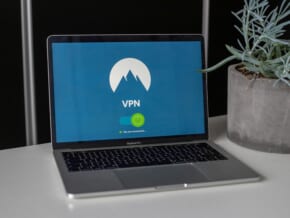Phishing Scams and Prevention Tips: Everything You Need to Know
Updated as of May 5, 2023.
Phishing scams are one of the most common methods of cyber-attacks you’re likely to come across online. These are hugely profitable attack methods for cybercriminals, who persuade you to take an action that consequently gives them access to your device, accounts, or personal information.
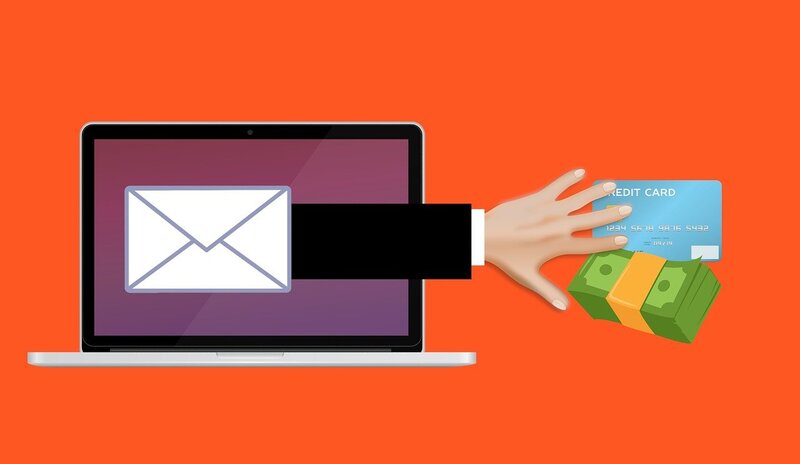 IMAGE from Pixabay
IMAGE from Pixabay
These schemes bait you with trust to get valuable information. This could be anything from using a social networking site login page to your identity via asking for your personal identification documents. These schemes may urge you to open an attachment, follow a link, fill out a form, or reply with personal info. By that logic, you must be on guard at all times which can be exhausting.
These threats can get very elaborate and show up all types of communication, even phone calls. The danger of phishing is that it can deceive anyone that isn’t skeptical of smaller details. Fortunately, they are avoidable if you know how to correctly identify and prevent them. To help you guard yourself without becoming paranoid, let’s see how these attacks work.
How does it work?
Anyone who uses the internet can be a target for phishing attacks. Scammers usually try to infect a device with malware; steal credentials to get victims their money or identity; obtain control of their online accounts; and convince them to transfer money. What’s worse is if a hacker gets into someone’s email, contact list, or social media, they can spam people they know with phishing messages seemingly coming from the victim. Trust and urgency are what make phishing so dangerous. If the hacker can convince someone to trust them and take action without hesitating, they’re going to be an easy target.
Who is at risk of phishing scams?
Phishing scams target everyone. If a scammer can find your contact information, they can add it to their target list. Your phone number, email address, online messaging IDs, and social media accounts are harder to hide nowadays. So, there’s a good chance that just having one of these makes you a target.
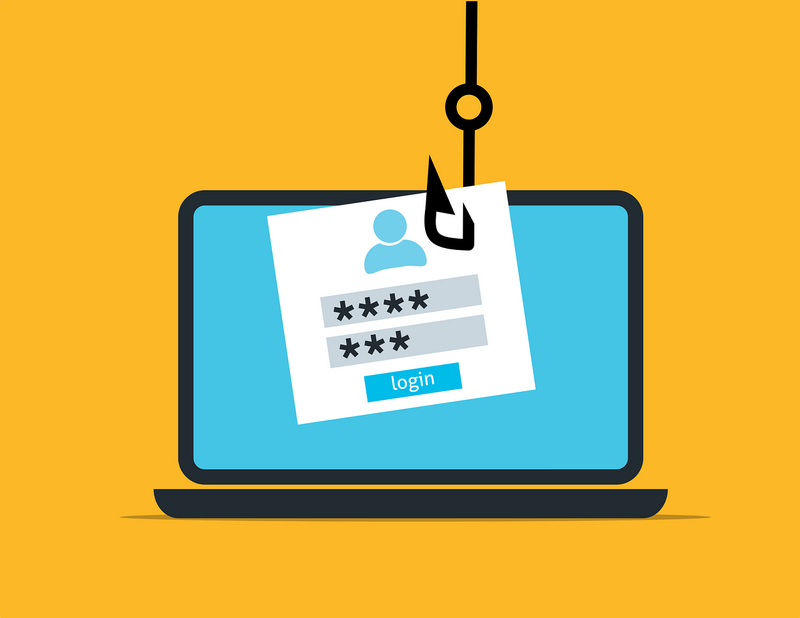 IMAGE from Pixabay
IMAGE from Pixabay
Nobody wants to fall prey to a phishing scam. There’s a good reason that such scams will continue, though: They are successful enough for cybercriminals to make massive profits. Phishing scams have been around practically since the inception of the Internet, and they will not go away any time soon. Fortunately, there are ways to avoid becoming a victim yourself. Here are 10 basic guidelines you should remember to keep yourself safe from such attacks:
1. Be updated on the latest phishing techniques – New phishing scams are being developed all the time. Without staying on top of these new phishing techniques, you could inadvertently fall prey to one. Keep your eyes peeled for news about new phishing scams. By finding out about them as early as possible, you will be at a much lower risk of getting snared by one.
2. Don’t click links right away – It’s fine to click on links when you’re on trusted sites. Clicking on links that appear in random emails and instant messages, however, isn’t such a smart move. Hover over links that you are unsure of before clicking on them. A phishing email may claim to be from a legitimate company and when you click the link to the website, it may look exactly like the real website. If you’re not sure, go directly to the source rather than clicking a potentially dangerous link.
3. Install an anti-phishing toolbar – Most popular Internet browsers can be customized with anti-phishing toolbars. Such toolbars run quick checks on the sites that you are visiting and compare them to lists of known phishing sites. If you stumble upon a malicious site, the toolbar will alert you about it. This is just one more layer of protection against phishing scams, and it is completely free.
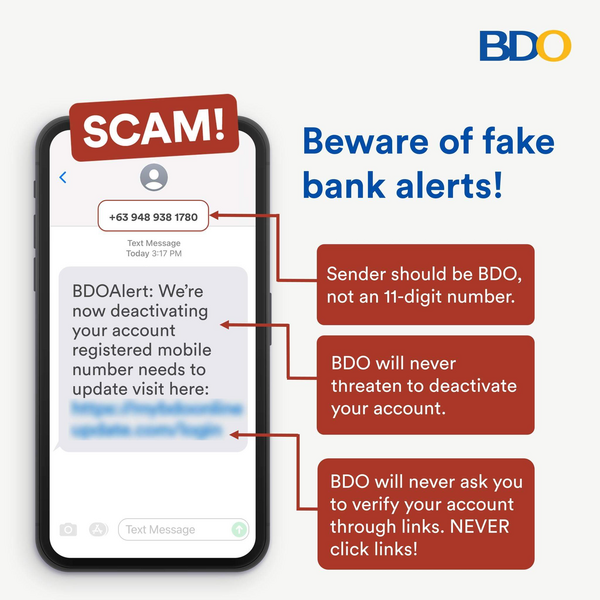 IMAGE from BDO
IMAGE from BDO
4. Verify a site’s security – It’s natural to be a little wary about supplying sensitive financial information online. As long as you are on a secure website, however, you shouldn’t run into any trouble. Before submitting any information, make sure the site’s URL begins with “https” and there should be a closed lock icon near the address bar. Check for the site’s security certificate as well. If you get a message stating a certain website may contain malicious files, do not open the website. If the user makes purchases at such a website, the credit card details will be accessed by cybercriminals.
5. Check your online accounts regularly – If you don’t visit an online account for some time, someone could be having a field day with it. Even if you don’t technically need to, check-in with each of your online accounts on a regular basis. Get into the habit of changing your passwords regularly too. To prevent bank phishing and credit card phishing scams, you should personally check your statements regularly, carefully ensuring no fraudulent transactions have been made without your knowledge.
6. Keep your browser updated – Security patches are released for popular browsers all the time. They are released in response to the security loopholes that phishers and other hackers inevitably discover and exploit. If you typically ignore messages about updating your browsers, stop. The minute an update is available, download and install it.
7. Use firewalls – They act as buffers between you, your computer, and outside intruders. You should use two different kinds: a desktop firewall and a network firewall. The first option is a type of software, and the second option is a type of hardware. When used together, they drastically reduce the odds of hackers and phishers infiltrating your computer or your network.
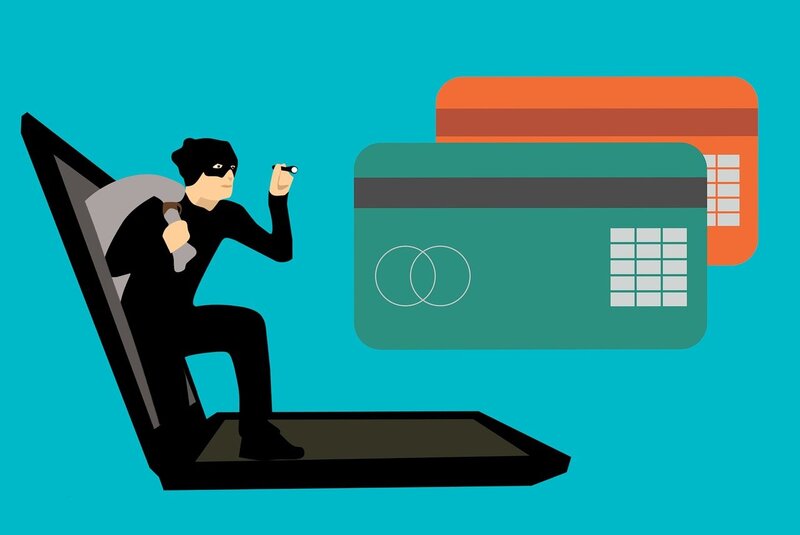 IMAGE from Pixabay
IMAGE from Pixabay
8. Be wary of pop-up messages and windows – Pop-ups often show as legitimate components of a website. All too often, though, they are phishing attempts. Many popular browsers allow you to block pop-ups; you can allow them on a case-by-case basis. If one manages to slip through the cracks, don’t click on the “cancel” button; such buttons often lead to phishing sites. Instead, click the small “x” in the upper corner of the window.
9. Don’t ever disclose your personal info online – As a rule of thumb, you should never share personal or financially sensitive information over the Internet. Most phishing emails direct you to pages where entries for financial or personal information are required. An Internet user should never make confidential entries through the links provided in the emails. Never send an email with sensitive information to anyone. Make it a habit to check the address of the website. A secure website always starts with “https.”
10. Use antivirus software – There are plenty of reasons to use antivirus software. Special signatures that are included with antivirus software guard against known technology workarounds and loopholes. Just be sure to keep your software up to date. Antivirus software scans every file which comes through the Internet to your computer. It helps to prevent damage to your system.
You don’t have to constantly live in fear of phishing scams. By keeping these tips in mind, you should be able to enjoy a worry-free online experience anytime, anywhere.
For Credit Card Holders
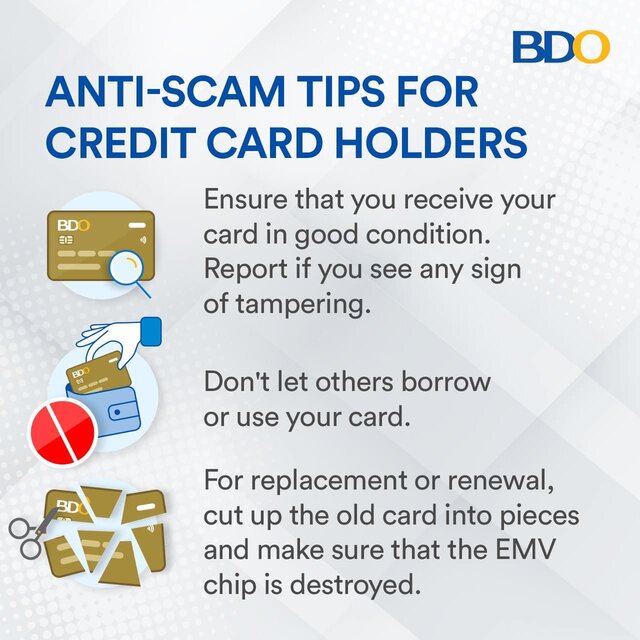 IMAGE from BDO
IMAGE from BDO
Here are some descriptive anti-scam tips for credit card holders.
1. Keep your credit card safe – Always keep your credit card in a secure location, and never leave it unattended. If you lose your card or suspect it has been stolen, report it to your bank immediately.
2. Be cautious of phishing emails and calls – Scammers may send you emails or call you pretending to be from your bank or credit card company, asking for your personal information. Be cautious of such emails and calls and do not provide any personal information unless you are sure of the authenticity of the request.
3. Monitor your credit card transactions – Regularly check your credit card statements and transaction history to ensure that there are no unauthorized charges. If you notice any suspicious activity, report it to your bank immediately.
4. Be wary of offers that sound too good to be true – Scammers may offer you deals or rewards that sound too good to be true, such as free vacations or prizes. Be cautious of such offers, and do not provide any personal information or payment without verifying the authenticity of the offer.
5. Sign up for fraud alerts – Many credit card companies offer fraud alerts that notify you of any suspicious activity on your account. Sign up for these alerts to stay informed about your account activity.
Remember, always be cautious and vigilant when it comes to your credit card and personal information. If you suspect any fraudulent activity, report it to your bank immediately.
Sources: Phishing.org, Kasperksy, BDO, and Lepide.





